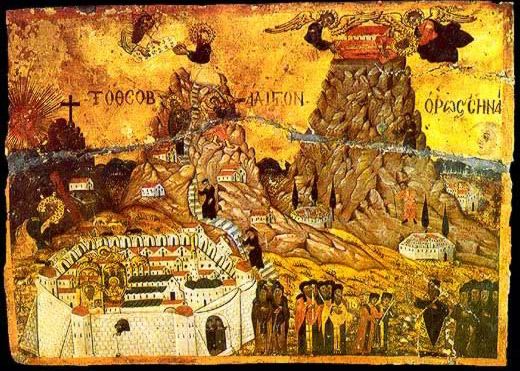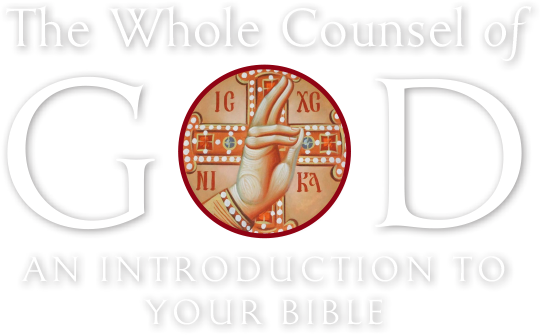 In last week’s post, the story of Jacob and Esau and the histories of Israel and Edom, the nations which took their names from the twins, were seen to lies in the background of St. Paul’s discussion of election in Romans 9-11. The Jewish people, which had been the primary recipient of God’s promises as a birthright, now found itself estranged, in large part, from those promises in favor of the recently redeemed Gentiles who already were coming to represent the great body of the Church. St. Paul elaborates on the fact that this pattern has happened before in the scriptures, the disastrous effects of allowing this transition to evolve into enmity, and most importantly the blessings that are promised when the Jewish people are reconciled to Christ and to their Gentile brothers within his body the Church. These particulars, however, raise the question of the general case. What does it mean that in the Old Covenant, Israel was elect, was God’s chosen. Is this related to salvation? What does this say about all of the other people of the world throughout history before the coming of Christ?
In last week’s post, the story of Jacob and Esau and the histories of Israel and Edom, the nations which took their names from the twins, were seen to lies in the background of St. Paul’s discussion of election in Romans 9-11. The Jewish people, which had been the primary recipient of God’s promises as a birthright, now found itself estranged, in large part, from those promises in favor of the recently redeemed Gentiles who already were coming to represent the great body of the Church. St. Paul elaborates on the fact that this pattern has happened before in the scriptures, the disastrous effects of allowing this transition to evolve into enmity, and most importantly the blessings that are promised when the Jewish people are reconciled to Christ and to their Gentile brothers within his body the Church. These particulars, however, raise the question of the general case. What does it mean that in the Old Covenant, Israel was elect, was God’s chosen. Is this related to salvation? What does this say about all of the other people of the world throughout history before the coming of Christ?
When St. Paul speaks of election in general and the election of Israel in particular, he speaks in the language of inheritance and birthright. His use of the story of Jacob and Esau is only one such example. His description of salvation in Christ uses this language in Romans 8 (v. 14-17, 29). He uses this language to describe the richness of the heritage which belongs to the Jewish people, Israel according to the flesh (9:4-5). This connection and this language is not an invention of St. Paul. This is the language which is used throughout the Old Testament to describe the promises which God made originally to Abraham (Gen 12:7). This is the way in which those promises were understood going forward, at the time of the conquest. The Hebrew root ‘nachalah’, usually translated in English with the word ‘inheritance’ is used 223 times in the Old Testament. 48 of these occurrences are in the book of Joshua, describing the land of Canaan as it had been promised to Abraham. It is also a major theme in the book of Numbers as particular allotments are made to tribes and families as their inheritance which is to be handed down to future generations. Israel’s chosen, or elect, status is therefore defined as their receipt of an inheritance from Yahweh, the God of Israel. There are many nations in the world, but Israel is the nation created by Yahweh to be the recipient of this inheritance. In Romans 8, St. Paul describes election as a chain of concepts (v. 29-30) which have the ultimate goal of creating sons and heirs of God (v. 16-17). The concepts of that chain are later in Romans ascribed to the nation of Israel as further definitions of its status, such as election and calling in 11:28-29, adoption in 9:4, and foreknowledge in 11:2.
Inheritance in the ancient world, as seen for example in the case of Jacob and Esau, was mediated through the firstborn son. In the case of the patriarchs, we see that the firstborn son of Abraham, Isaac, was the son who received the promises. This would have been Esau, but through the reversal discussed in the previous post in this series, came to be Jacob. This did not, however, mean that all of the other children were disinherited or cast out of the family. Families were large in the ancient world not primarily through a large number of children but because they included the entire extended family. Neither Lot nor Ishmael were Abraham’s heir, but they were both members of the family and received an inheritance for themselves and their descendants within the land that was promised initially to Abraham. Likewise Esau, though he forfeited his birthright through unbelief, was not removed from the family, but received an inheritance for himself and his posterity likewise. Jacob, however, was the recipient of the fullness of the promises. Israel is referred to repeatedly in the Old Testament as God’s firstborn, a people whom he created himself (Ex 4:22-23, Hos 11:1).
Israel’s status as elect or chosen, then, does not mean that the promises are exclusively for Israel, but that it is through Israel as the heir that the promises and blessings of God are mediated to the entire human family. When the promises are made to Abraham, they are made as gifts given by God to Abraham’s seed, but through these gifts all families of the earth will call him blessed (Gen 12:3). The promise to Abraham is not that from him God would make a great nation to whom alone his grace would be given, but rather that a multitude of the nations would be born from him (Gen 17:4-6). Among these nations which were Abraham’s offspring, Israel would have the status of firstborn. Israel was not blessed for its own benefit only, but it was to be a light to the nations (Is 49:6). Though the temple of Yahweh the God of Israel was only one and existed in one place where God dwelt in the midst of Israel, at the temple’s dedication Solomon expresses its purpose as ultimately being a place where those of all the nations of the world will come to worship Israel’s God (1 Kgs 8:41-43). It is prophesied by Isaiah that when the Messiah has come, this will be realized as foreigners come to worship the God of Israel and the temple becomes a place of prayer for all the nations of the world (Is 56:3-7). Israel was chosen and called to be the vehicle through which God would work in the entire world, not called to be removed from it. God loves the entire world and he chose in the Old Covenant to express that love in and through the nation of Israel. It could therefore rightly be said that “salvation is of the Jews” (Jn 4:22).
The situation, parallel to Jacob and Esau, which St. Paul describes in Romans then is a situation in which whereas once it was Israel who was the firstborn and heir through which the promises of God were mediated to the world, now it is the Church, which was already coming to be predominated by Gentiles. It is now through the Church that the God of Israel works in his creation as St. Cyprian of Carthage said in his famous dictum, “Outside the Church there is no salvation.” This is not, in St. Paul’s understanding, a situation in which Israel has been cut off completely and the Church has now replaced it. Nor is it a shift in firstborn status from Israel to Church directly. Rather, St. Paul sees this change as having taken place in the person of Jesus Christ. The heritage of Israel from the patriarchs to his birth culminates in the person of Jesus Christ (Rom 9:5).
Christ, the only begotten Son of God, is the singular seed of Abraham in whom the inheritance finally come to rest (Gal 3:16-18). Belief for the patriarchs had been belief that the promises of God would be kept and come to fulfillment. Belief for St. Paul is thus belief that those promises have found their fulfillment in Jesus the Messiah. Christ therefore is the one who truly has the elect and chosen status, hence St. Paul’s constant phrasing that all of the grace and blessings of God are ours ‘in Christ’. It is Christ who fulfills the calling of being the light to the Gentiles (Luke 2:32-33). Membership in the family of Abraham and thereby a share in his inheritance is, for St. Paul, possessed by this belief (Gal 3:7). Those who do not believe in the fulfillment of the promises in Jesus Christ, though they may be ethnically descended from Abraham according to the flesh, have cut themselves off from that family (Rom 9:6). This stands behind the analogy St. Paul uses of the olive tree and its branches (Rom 11:16-24). Abraham’s family is also the family of God and so the adoption of believers within the Church is an adoption into a family centered around Christ as firstborn (Rom 8:29). We become fellow sons and fellow heirs with Christ (8:14-17).
Further, for St. Paul Christ is the firstborn of all creation (Col 1:15). This is not to say that Christ came into existence at some point in time before the creation did. As we have seen ‘firstborn’ is a status not a matter of historical order. All of the Triune God’s work in his creation, from the creation itself, to our salvation, to the eventual transfiguration of all things as they are made new takes place through and for Christ (1:16-20). The inheritance fulfilled in Christ is not a piece of land or a bodiless enjoyment in an ethereal realm, but the entire earth, the entire creation itself (Rom 8:19-23, Heb 11:16). The chosen, or elect, status of the Church therefore derives from the elect status of Christ himself. St. Paul moves quickly from the imagery of Christ as the firstborn and inheritor who distributes the inheritance to his brethren to the imagery of Christ as head of the body (Col 1:15-18). All of the benefits of being chosen by God are ours in Christ, including adoption (Eph 1:3-10). What this election in Christ means is that in him we receive an inheritance (Eph 1:11-14). This inheritance comes with being a part of the household of God (Eph 2:19).
Next week’s post will discuss the way in which this understanding of elect or chosen status and inheritance relates to us as individual human persons.

Fr Stephen,
Thanks for another great post. I love the way you traced the ideas of firstborn status and inheritance throughout scripture, and connected them to fulfillment in Christ as seen in Paul’s letters. I especially appreciate the “inclusive” nature of election you’ve explained here – that *through* God’s elect, the nations will be blessed. I’ve never heard it explained so well. Thanks for your work to lead us through scripture concerning these long-debated issues!
Thank you Father Stephen.
Stating that St. Paul “speaks in the language of inheritance and birthright” and that election, foreknowledge, calling and adoption are a “chain of concepts” and definitions of Israel’s “status” is very helpful terminology. Even after turning away from the Calvinistic teachings of election, I still would have had difficulty describing exactly what St. Paul meant by it except to say God does not predetermine a person’s salvation as are wills are not under such constraint.
Many thanks for your teachings, including the ones in the archives. Looking forward to your next post!